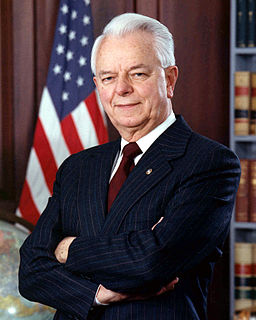A Quote by Joe Biden
The Constitution says the President shall nominate, not maybe he could, maybe he can't, he shall nominate. Implicit in the Constitution is that the Senate will act on its constitutional responsibility and give its advice and consent. No one is required to vote for the nominee.
Related Quotes
I understand the politics of the situation, I think that many Republican members of the senate believe that,get out the vote move. They can indicate that they're strong for their base. But the Constitution's pretty clear. The president Donald Trump has to nominate someone. The senate can choose to disapprove. There's nothing in their Constitution that says the grounds upon which they must vote. But to refuse even to meet with the individual, or to have the process go forward, that's just pure politics.
While the president is to nominate that individual [to Supreme Court], we in the Senate must provide our advice and consent. This function is not well-defined. The Constitution does not set down a road map. It does not require hearings. In fact, it does not even require questioning on your understanding of the Constitution nor the role of the Supreme Court.
When it comes to the Supreme Court, the American people have only two times when they have any input into how our Constitution is interpreted and who will have the privilege to do so.First, we elect a president who has the power to nominate justices to the Supreme Court.Second, the people, acting through their representatives in the Senate, have their say on whether the president's nominee should in fact be confirmed.
I remember George Mitchell - I was doing the Clarence Thomas hearing, and there were 48 senators declared they were not prepared to vote for him at the front end. We could have filibustered that and stopped it. George and I - George was the leader at the time - took the heat from every liberal group saying, "No, no, that's not the way the system is supposed to work, since the Constitution - the president shall propose and the Constitution shall dispose, we're going to let them hear this."
The NRA believes America's laws were made to be obeyed and that our Constitutional liberties are just as important today as 200 years ago. And by the way, the Constitution does not say Government shall decree the right to keep and bear arms. The Constitution says 'The right of the people to keep and bear arms shall not be infringed.'































